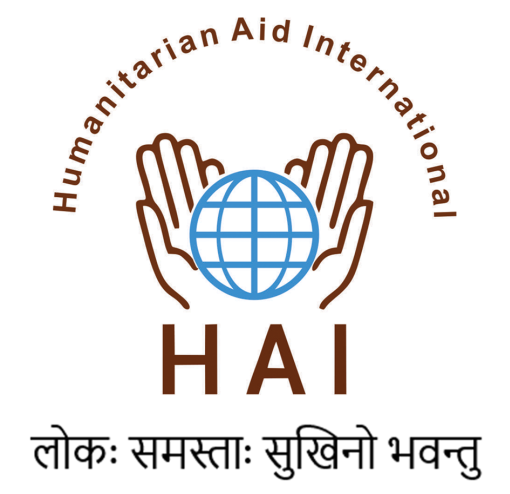After having worked for over three decades, mainly with international NGOs (INGOs) within India and elsewhere, and feeling disillusioned with the international aid architecture, I decided to return to India to establish Humanitarian Aid International (HAI), together with a few other like minded people. HAI aims to evolve on an Indian value system, resourced by Indians, including people of Indian origin, to work across India while also trying to complement the government’s efforts on South-South cooperation. The realisation came soon about how difficult it is for Indian NGOs to access even Indian funding as Indian fundraising space is largely controlled and accessed by country offices of INGOs, registered in India and calling themselves an Indian organisation. That compelled me to wonder: Are we in a new phase of colonialism?
Please click here to continue reading.
Reclaiming Local Civil Society Space
A 2019 study published by the EU on ‘Societies outside Metropolises: The role of civil society organisations in facing populism’ recommends that “Concrete and consistent actions over time are needed in order to empower civil society organisations in those regions to deliver their mission and play their role of speaking on behalf of those who are underrepresented and advocating for the marginalised, and to educate and create a kind of genuine bond between different communities”. However, the way the international aid sector currently operates most instrumentalises local and national CSOs as subcontractors for their agendas, rather than supporting them as independent civil society actors catering to the real needs and priorities of the community and encouraging their governments to act as the duty-bearer and protect people’s fundamental rights. The Covid19 pandemic has extensively and adversely impacted the aid architecture, at a time when the lifesaving assistance to population facing natural disasters or protracted crises is most needed. Local organisations are facing further marginalisation at a time when they are at the forefront of the response, be it Covid19 health response or economic or other crises caused during this period. Download Statement.
Using Cash Transfer as an Innovative Approach in COVID-19 Humanitarian Response
At Humanitarian Aid International we are pledged to help people facing a crisis in life; something that we are doing for many years. Our professional team consists of humanitarian and development experts, and our 24/7 active volunteers, whom we consider the backbone of this organization.
HAI’s motto is to help the people affected by a natural calamity like earthquake, flood, pandemic, etc. We are pleased to do anything to help the people in need as well as those on the call of duty.
Helping the People Trapped in Distress

The global COVID 19 pandemic has upended many lives in India. Though, COVID affected all of us, those on the edge were the 140 millions Indian employed in the informal sectors. These were farm laborers, rickshaw pullers, vegetable and fruit vendors, brick kiln workers, daily wage labours, auto drivers, roadside vendors and others. With the imposition of countywide lockdown they faced serious livelihood crisis. Thousands were stranded on roads after losing their job and livelihood. With all their savings gone and no sign of relief, thousands began their on foot journey for their homes. Men, women, children walked hundreds of kilometers on foot, often sleeping hungry on roadside.
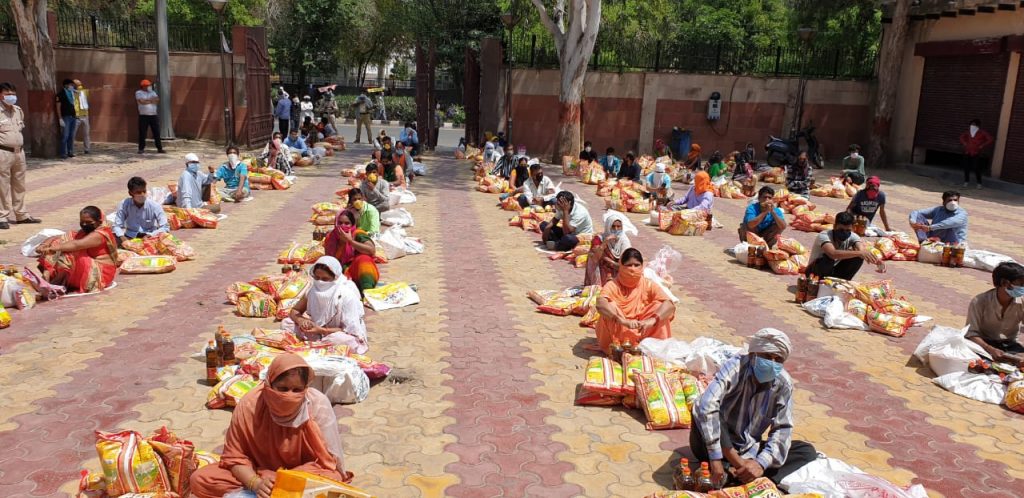
HAI has helped thousands of such families and daily wage earners, throughout the country, facing life and death situation in wake of the pandemic. We have provided food to the hungry, distributed PPE kits to the healthcare workers; helped municipal bodies in sanitization and in identifying people in need, etc. We reinstate our commitment to helping the people in distress and also the agencies working for them.
All through the pandemic we have attended thousands of distress calls in several states. Sometimes, the person making the request even asked to pay the rent for his/her family’s accommodation. True to our commitment of helping them, we have even transferred rent directly in the house owner’s account.
The restrictions of lockdown relaxed almost completely, life is returning to normalcy. But even today millions of workers are still not able to secure means of livelihood and are forced to sleep hungry under open sky.
Helping Swiftly and Smartly
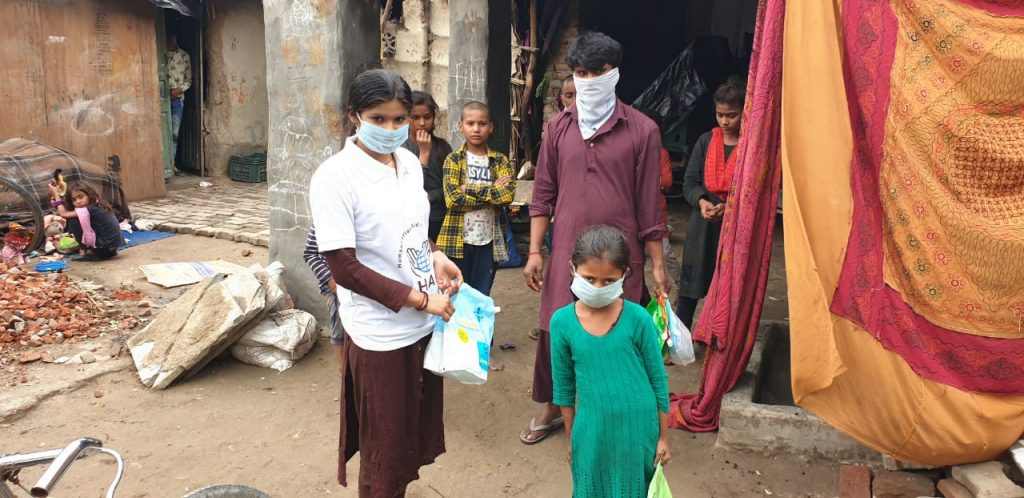
When our volunteers receive a request they verify beneficiary details that is, number of family members, financial condition, employment and all. Once the details are verified, the beneficiaries are asked to go to a ration shop that accepts digital payment. Our designated team member coordinates the transfer of ration to the beneficiary and the payment of shop’s bill by HAI.
Also, to make the transactions transparent and to ensure that every single penny is justly used, we transact through virtual platforms Paytm, Google Pay, Phone Pay, etc.
Donate for the Cause
Every day, as we move on to help new poor families, feed them and help them pay their rents, we thank our donors from the bottom of our hearts for making it all possible. Not only HAI family but also the beneficiaries are obliged to the common people donating for this noble cause.
This, in turn, puts an obligation back on us to make sure that every single rupee you donate is used only for the cause. We understand the value of your hard earned money and for this we have tried to make transactions completely digitalized, making it more transparent right from the donor to the beneficiary level.
Our Future Goals
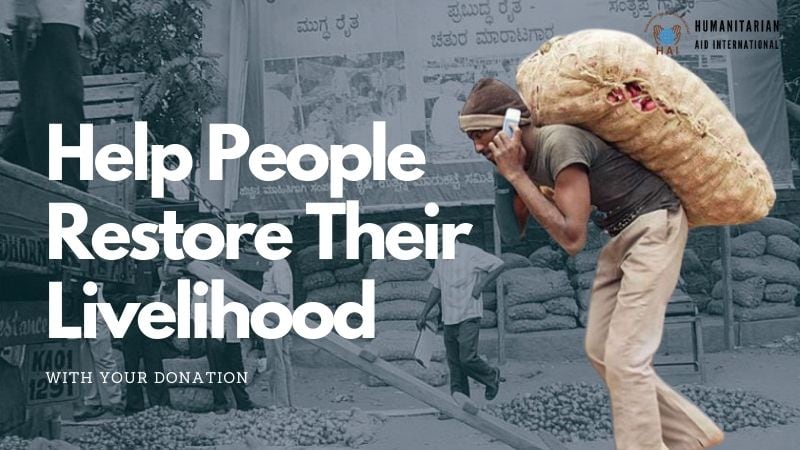
We at Humanitarian Aid International have always felt the need to provide a permanent solution to the problems of people affected by a calamity. We feel that helping them by providing food and shelter, though noble, is only a temporary solution.
In the future, we aspire to help people with finding permanent employment and means of livelihood and making them stand up on their feet once again after the ordeal.
We also aim for helping out millions of migrant workers who are left jobless after the pandemic. We seek to coordinate with the local government agencies in generating and jobs locally to help the migrant workers.
Please click here to access the full report.
Covid 19 Livelihood Restoration Program
Daily wage workers, street vendors, delivery boys, auto rickshaw drivers, push cart vendors, to name a few who depend solely on their daily earning have been struggling hard to make ends meet during this Corona Epidemic. Waging a battle for survival due to lock-down is quite difficult.
While we all are praying that things come back to normal, HAI is taking a step ahead and helping people ( around 100) restart, who have lost their daily livelihood due to Corona.
HAI would help them in purchasing cart, one time supplies, tools, accessories so that they may start with a small enterprise. Of course, this would be done with due diligence by checking the will and skill of the individual to run his/her business once it is set up.
Help people like Kripa Saran to restore their livelihood
To begin with lets meet Kripa Saran from Zila Bulandshahar, UP :
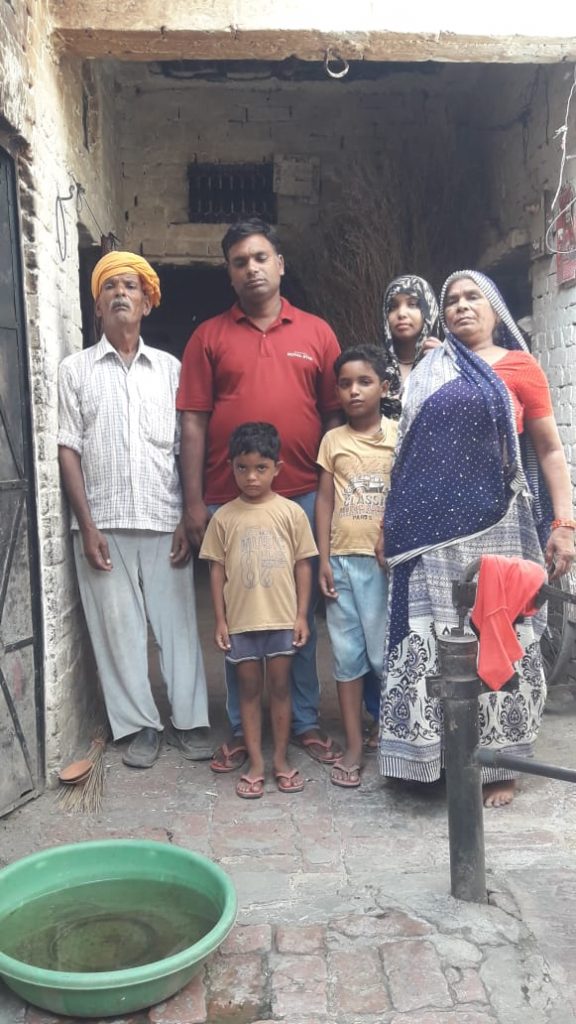
Due to the lock-down, Kripa Saran along with millions of others is now unemployed and is facing severe hardships due to the onset of Covid19.
Kripa Saran lives in a family of 6, and is the sole breadwinner. He worked as a daily wage earner at a clothing store at Chandni Chowk, and the job although came with immense lack of security, guaranteed food on his plate. Unemployment has now pushed Kripa Saran to stop the education of his children as now, money is more uncertain than ever.
In order to save up money, Kripa Saran along with his family has relocated to his village, and hopes to start his life afresh. He wishes to purchase an E-rickshaw and wants to be able to provide for the basics of his family again.
We at HAI, with your help and contribution can help Kripa Saran start his life over. Even the smallest of your contributions can make a world of a difference to him.
Local Actors Matter
Dear Grand Bargain Sherpas,
We, one of the multi-country networks of local actors actively engaged on localisation, know that the next annual meeting of Grand Bargain on 24-25 June 2020, is open only to the Grand Bargain Signatories, and only Sherpas will be able to use audio and video. We see the signatories wanting to talk about the future of Grand Bargain and strengthening local action, without presence of local actors around the table who continue to face obstacles to get included in a process, designed for their empowerment. We have tried to proactively engage with the localisation work stream but have been very disappointed with the lack of response. We have seen systematic exclusion and discrimination against meaningful participation of a diversity of local actors in many of these processes.
We believe you share our concern of seeing less than expected progress on most of the workstreams, according to the self-reports of the signatories. The World Humanitarian Summit triggered several good processes, intending to reform the humanitarian architecture and practices for overall aid efficiency, mitigation of needs and better support to the affected population. Given the slow progress, we are hopeful that the Signatories would use the next annual meeting to introspect on the reasons for the slow progress, define the mechanisms to fix the accountability and answerability and come up with a future roadmap which is more inclusive, equitable and respectful of the local actors.
The local actors do not want to remain passive beneficiaries of a change process. They rather want to have equal stake, ownership, shared leadership and representation across all the processes and the discussion fora. We, as one of the committed network of local actors, firmly believe that the signatories are genuinely interested to deliver on the Grand Bargain commitments by overcoming the barriers. As we do not have the privilege of being present, we would like to request that you kindly reflect on the following issues during the annual meeting in our absence:
- Reflect on the recommendations, made by Alliance for Empowering Partnerships (A4EP) in its paper ‘The Grander Bargain’ and incorporate them in the future plan of the GB
- Engage local actors and their various relevant networks, including A4EP, in the discussion deciding future of the Grand Bargain, as that largely determines our future
- While finalising the next 12 month’s plan, keeping Covid19 response into consideration, do plan adequate engagement of local actors in the planning process as well as the implementation
- Please ensure adequate representation of local actors (at least 50%) in the 5-year anniversary meeting of the Grand Bargain
- The 5″ annual report, instead of being a self-report from signatories, should be externally verified and written, based on the evidence provided by the signatories
- Restructuring of workstreams in the final year to ensure at least 50% leadership position going to local actors
- Signatories to publish cumulative financial reporting on IATI or FTS to ascertain the quantity and quality of funding being passed on to local actors
- Report on all the financial investments that have been made on localisation research, meetings and conferences and their effectiveness in terms of tangible change
- Since the country offices of the signatories have often been the biggest barriers in the localisation process, a system ought to be created to make them as accountable and answerable as their headquarters are. IASC definition shouldn’t be manipulated in the final year of the GB to deny funding to homegrown local actors.
Although, local actors are overwhelmingly not allowed to participate in the annual meetings, we are still optimistic that our concerns would be heard and reflected on during the 2-days of the meeting, and that appropriate space would be created for us for future collaboration.
In the humanitarian architecture, each of us have to play the complementary role. As Signatories, you have acknowledged the significant role local actors play during a humanitarian response. We have equal realisation of the complementary role you play to strengthen us. Hopefully, next time we would be sitting across the table as equals to exchange ideas.
Members of the Alliance for Empowering Partnership
#LocalActorsMatter
Thank You – Feed The Daily Wagers During Coronavirus Lockdown
Since the onset of Corona, we all have been impacted by this pandemic in some way or the other. However, its very evident that the daily wagers who work on a daily basis to earn their living are struggling hard to make ends meet.
HAI has never shied away from its social responsibility and it took up the initiative of feeding the daily wagers. An appeal was made to people to provide their support. It was heart-warming to see the welcoming response whereby a lot of Samaritans came forward in this hour of need.
People from all walks of life contributed as per their capacity. “There is nothing big or little. Every single contribution matters“. As a matter of fact, some of them also chose to be anonymous.
Thanks to your donation, here’s what HAI did during the lockdown
With your support HAI has been able to provide food to around 2000 people approximately on a daily basis. HAI had been allocated curfew passes by the Government of Delhi for this initiative.
Apart from feeding, we have also distributed dry ration to families who have lost their mode of earning. HAI also focused on the personal hygiene by distributing materials and conducting awareness camps at Majnu ka Tila and Signature Bridge.
As we say, “Action speaks louder that words” and “Helping hands are better than praying lips”. If we have been blessed then we should always “Pay it forward”.
With this note, a heartfelt Thank You to each one of you and also sharing a synopsis in the video about the work done by HAI in the lockdown period.
The funds collected are utilized for all activities conducted under “Covid 19” campaign in Delhi/NCR, UP, Maharashtra and Karnataka. The list is transparent and can be accessed via the link below :
